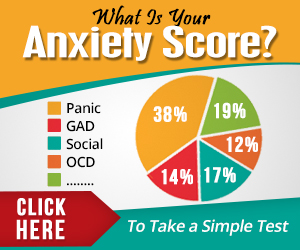Can You Faint From a Panic Attack?
Click play to hear Barry explain this anxiety sensation.
When someone experiences high anxiety or panic, it’s very common to feel light-headed or dizzy. This sensation is alarming because it makes you feel very vulnerable. If you’re alone, you might fear falling in unconsciousness with no one to look after you. Or if the sensation happens in public, it can lead to feelings of vulnerability surrounded by strangers.
The dizziness often felt during an episode of anxiety is caused by increased respiration. People tend to overbreathe, or hyperventilate, when they’re anxious, which can lead to dizziness or light-headedness. Dizziness can also be triggered by pressure to perform in situations. For example, you may think this:
I don’t know why, but any time my boss asks me a question, I freeze up and start to feel dizzy.
Certain situations can also trigger anxious memories, like this:
I felt dizzy the last time I was in an elevator, and now, every time I get in one, I start to feel a bit woozy.
It’s very uncommon for a person to faint when feeling anxious or threatened. This is because fainting is the result of low blood pressure. When we faint, the body falls to the ground; this allows blood to be easily supplied to the brain, a clever safety mechanism. When you feel anxious, your blood pressure goes up, not down. Hence, fainting is unlikely because your brain has plenty of blood supply.
You might remember old movies like King Kong, where Fay Wray faints in the arms of Kong. But this type of reaction has more to do with dramatic tension; it isn’t how most people react to a threat. Panic results in a heightened sense of alertness, not fainting.
Think of situations where people are faced with imminent threats, such as a robbery or major catastrophe. People don’t faint left, right, and center. They always respond with a heightened sense of alertness. They respond because their bodies have been primed to jump into action by adrenaline releasing into their system. Their hearts are beating faster, their breathing increases, and blood is flowing fast. This is a prehistoric response to threats that has been with us since early mankind.
Quite simply, fainting when anxious is highly uncommon due to the amount of blood that’s being circulated. Your heart is usually beating fast, and there’s little worry that the brain would be short of a fresh supply. Frequently, people who have fainted in the past tend to be particularly frightened by a dizzy spell because they feel that if it happened before, it’s likely to happen again.
If you’ve fainted before and fear it might happen again, try to remember the circumstance you were in: Were you tired? Was the temperature very hot? Had you eaten correctly that day? Fainting can be the result of many different factors, but generally it has little to do with anxiety and is more frequently associated with energy levels, diet, or temperature.
Some people tell me that, regardless of the facts I’ve stated, they still can’t shake off the fear of fainting when feeling anxious. If you struggle with this fear on an ongoing basis, you need to disempower the fear. The next time you feel light-headed or dizzy and thoughts of fainting begin to trouble you, find a place to sit comfortably. Remind yourself of what I’ve written here, and then tell your body that if it wishes to faint, do so now. You give your body complete permission to faint if that’s what’s needed.
No one can faint on demand. What you’ll find is that the fear evaporates quickly as you call its bluff. Sit there and say to your fear:
If you’re going to make me faint, I’ll give it a few more minutes. But if not, then I have to get on with my day.
Do this, and you’ll quickly feel more comfortable and confident to continue what you were doing. Challenge the fear of fainting in this manner, and you’ll soon find that the idea of fainting doesn’t bother you anymore.




